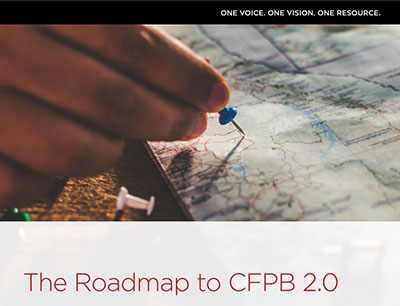
MBA Releases The Roadmap to CFPB 2.0
The Mortgage Bankers Association yesterday released a new paper, The Roadmap to CFPB 2.0, which details recommendations to ensure stability and consistent consumer protections in the Consumer Financial Protection Bureau’s practices and consumer financial laws.
 The paper draws from detailed responses MBA submitted to a series of 12 requests for information the Bureau released in 2018 seeking suggestions for how it could better align its supervisory practices and the regulations it administers with its statutory mandate and generally accepted principles of sound prudential regulation.
The paper draws from detailed responses MBA submitted to a series of 12 requests for information the Bureau released in 2018 seeking suggestions for how it could better align its supervisory practices and the regulations it administers with its statutory mandate and generally accepted principles of sound prudential regulation.
“The Bureau has shown an admirable willingness to listen to stakeholder concerns about how it can improve both its own practices and the regulations it is tasked with enforcing,” said MBA President and CEO Bob Broeksmit, CMB. “The recommendations laid out in this roadmap will further strengthen CFPB’s policies and ensure that all consumers are treated fairly and equally and have access to the quality sustainable products they deserve.”
Since 2011, when it assumed broad authorities under the Dodd-Frank Act, the CFPB has exercised its authority to drastically change the regulatory regime over consumer financial products and services.
“No industry has been more impacted by this transformation than the housing industry,” MBA said.
Specifically, the paper offers a comprehensive inventory of reforms needed to ensure the CFPB is able to meet its dual statutory mandate to vigorously enforce consumer protections and enable financial opportunity. It centers on the Bureau’s core regulatory functions–rulemaking, enforcement, supervision and market monitoring–and the regulations it administers.
The paper encompasses more than a dozen sets of recommendations, including:
–Rulemaking Processes: Create a “rule on rules” that promotes responsible rulemaking.
–Guidance Processes: Adopt clear guidance policy that provides guidance in response to public feedback and uses guidance appropriately and reliably.
–Civil Investigative Demands: Provide clarity and specific notifications for purposes of CIDs with realistic timelines.
–Enforcement Processes: End “regulation by enforcement” permanently; limit enforcement to clearly defined standards; adopt transparent procedures for concluding investigations; require fairness and consistency in processes; and establish a civil money penalties matrix.
–Administrative Adjudications: Promote transparency; allow for removal to federal courts if respondent elects to do so; and address procedural deficiencies.
–Examination Processes: Examinations should not demand “perfection” but rather a compliance management system that is commensurate with the institution’s risk profile.
–Consumer Complaint Database: MBA recommends the public-facing complaint database be withdrawn.
–Loan Originator Compensation: Allow loan officers to make “competitive concessions;” allow companies to hold loan officers accountable for mistakes; and create exemptions to allow for variable compenstaion.
–Ability to Repay/Qualified Mortgage Rule: Allow for government-regulated underwriting standards to replace Appendix Q; Extend the GSE “patch;’ and raise cap on points and fees.
–TILA/RESPA Integrated Disclosure Rule: MBA asks the Bureau to clarify TRID liability.
–RESPA Section 8: Issue guidance on application of Section 8 to common industry business arrangements.
–Home Mortgage Disclosure Act: Eliminate discretionary data elements; exempt business-to-business loans secured by multifamily properties; increase privacy protections on publicly reported HMDA data.
This document is a follow-up to MBA’s 2017 paper, CFPB 2.0: Advancing Consumer Protection, which focused on how the CFPB could better protect consumers by publishing clear, consistent regulations and bright-line guidance rather than using enforcement actions to announce new, binding standards.
MBA’s The Roadmap to CFPB 2.0 can be downloaded at https://www.mba.org/2019-press-releases/march/mba-releases-new-paper-the-roadmap-to-cfpb-20.
